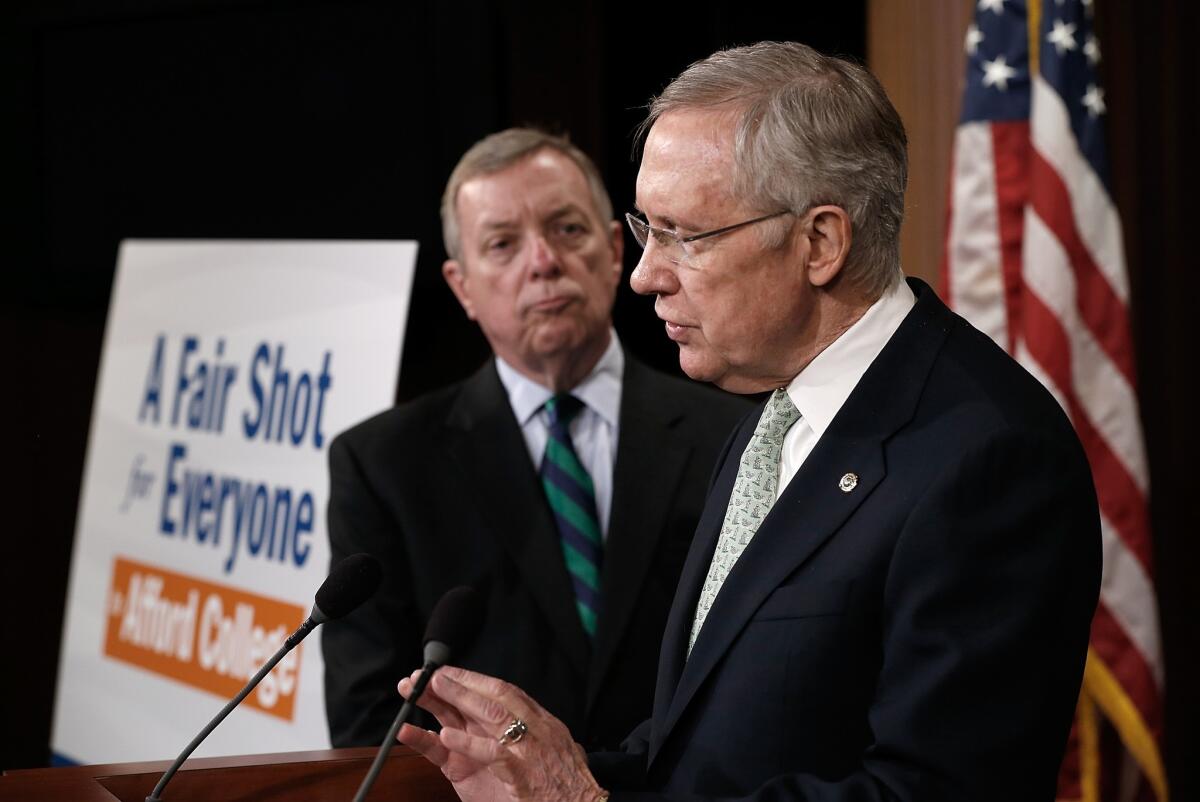Senate’s top Democrat opposes controversial Obama judicial pick

In a rare break with the White House, Senate Majority Leader Harry Reid (D-Nev.) announced his opposition to President Obama’s controversial pick for a seat on the federal bench in Georgia.
Reid’s comments Thursday about the nomination of Michael Boggs are a potentially fatal blow to Boggs’ chance of confirmation to the District Court, and another setback for a White House nominee despite Democrats’ move last fall to eliminate a major hurdle to confirming Obama’s picks.
Reid, who initially withheld judgment on Boggs after the nominee faced tough questioning from Democrats on the Judiciary Committee over his record on gay marriage, civil rights and abortion, told reporters at a news conference Thursday that he couldn’t support him.
“He’s a person who, in my opinion, is not in the mainstream, and I don’t think he deserves to be a federal judge,” Reid said.
Speaking later with reporters, Reid took a veiled shot at the White House for even putting the nomination forward.
“Somebody should have looked a little deeper into his record,” he said.
Reid’s comments came just before White House counsel Kathryn Ruemmler was set to address the Senate Democratic caucus at its private luncheon. Sen. Richard Durbin (D-Ill.), the assistant majority leader, said the discussion focused on David Barron, another nominee who has raised concerns among some Democrats, and that Boggs did not come up.
Boggs was nominated as part of a compromise with Georgia’s two Republican senators, who, by virtue of what’s known as the blue-slip procedure, had the ability to block consideration of any judicial nominees from their states.
Boggs was one of seven nominees who went before the Judiciary Committee this week as part of that deal, which called for all seven to be nominated together. The condition was a concession to Republicans, who supported Boggs’ nomination.
At the hearing, Boggs, a former two-term state legislator and now a Georgia appeals court judge, said he regretted his vote on an amendment that required doctors to disclose the number of abortions they performed, calling it “ill-conceived.”
He left his position on same-sex marriage unclear, saying his previous opposition “may or may not have changed.” And he explained his vote to reinstate a version of the state flag that included the Confederate stars and bars by saying he was following the overwhelming interest of his constituents.
Though Republicans are expected to support him, it’s unclear if Boggs has the two Democratic votes on the committee he needs to advance. Reid would not guarantee a vote of the full Senate on his nomination even if the Judiciary Committee approved him.
“We’ll see,” Reid said.
Durbin, who serves on the Judiciary Committee, also expressed concerns about Boggs but said he was withholding judgment until he spoke with Rep. John Lewis (D-Ga.), an icon of the civil rights movement.
“I’m troubled by many of his statements and his record,” Durbin said of Boggs.
The White House reiterated Wednesday that Obama stood behind the nomination, while noting that it was crucial to a deal that would pave the way for five female nominees to be confirmed from the state.
“The president of course believes that each senator should vote as he or she sees fit,” Press Secretary Jay Carney said. “He believes that all of the nominees he sends up are qualified, and that includes Judge Boggs.”
Sen. Saxby Chambliss, one of the Georgia Republican senators who recommended Boggs, said in an interview that he also expects the nomination to be brought to a vote.
“I expect there will be seven different votes,” Chambliss said, adding that it would be a “problem” if Boggs was denied one.
Boggs’ opponents say they do not think there are enough Democrats to approve his nomination either in committee or on the floor.
If the nomination fails, Republicans on the Judiciary Committee could retaliate by using procedural rules to make committee meetings difficult to schedule, opponents said. Another avenue would be for other Republican senators to hold up any further nominees from their states, though that might invite Senate Judiciary Committee Chairman Patrick J. Leahy (D-Vt.) to end the blue-slip courtesy.
A vote on Boggs in committee is probably several weeks away, as senators have indicated they want him to respond to a number of written questions. It is unclear whether Leahy would go ahead with voting on the other Georgia nominees.
“Sen. Reid’s stand carries great weight,” said Sen. Richard Blumenthal (D-Conn.), a member of the Judiciary Committee, who said he still wants to follow up with Boggs on issues that came up during his confirmation hearing. “If the nomination is withdrawn in the meantime, so be it.”
As for Barron, nominated for a seat on the 1st Circuit Court of Appeals in Boston, some of the same liberal groups who oppose Boggs predict that Barron will be approved, possibly as early as next week. As a Justice Department lawyer, Barron wrote at least one memo that provided the legal justification for the targeted killing of Anwar Awlaki, a U.S. citizen who was slain by a drone strike in Yemen in 2011.
Reid noted that since Democrats changed Senate rules to lower the threshold for nominees to advance, from 60 votes to a simple majority, they have “made significant progress, tremendous progress” confirming Obama’s judicial nominees, though some others remained stalled at the committee level.
“It’s a shame that they’re being obstinate on all these other nominations, but we’re going to take a look at it and do what we need to do,” he said. “I would hope that we don’t need to change the rules again.”
Timothy M. Phelps contributed to this report.
More to Read
Start your day right
Sign up for Essential California for news, features and recommendations from the L.A. Times and beyond in your inbox six days a week.
You may occasionally receive promotional content from the Los Angeles Times.






